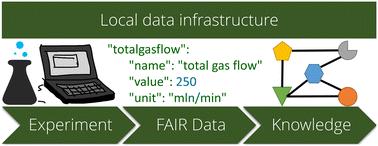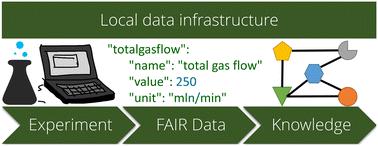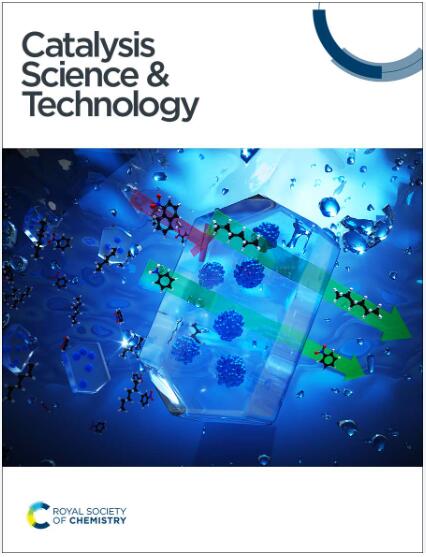Advancing catalysis research through FAIR data principles implemented in a local data infrastructure – a case study of an automated test reactor†
IF 4.2
3区 化学
Q2 CHEMISTRY, PHYSICAL
引用次数: 0
Abstract
Findable, accessible, interoperable, and reusable (FAIR) data is currently emerging as an indispensable element in the advancement of science and requires the development of new methods for data acquisition, storage and sharing. This is becoming even more critical as the increasing application of artificial intelligence demands significantly higher data quality in terms of reliability, reproducibility and consistency of datasets. This paper presents methods for the digital and automatic acquisition and storage of data and metadata in catalysis experiments based on open-source software solutions. The successful implementation of a digitalization concept, which includes working according to machine-readable standard operating procedures (SOPs) is outlined using a reactor for catalytic tests that has been automated with the open source software tool EPICS (Experimental Physics and Industrial Control System). The process of data acquisition, standardized analysis, upload to a database and generation of relationships between database entries is fully automated. Application programming interfaces (APIs) have been developed to enable data exchange within the local data infrastructure and beyond to overarching repositories, paving the way for autonomous catalyst discovery and machine learning applications.


通过在本地数据基础设施中实施 FAIR 数据原则推进催化研究--自动测试反应器案例研究
可查找、可访问、可互操作和可重用(FAIR)数据目前正成为科学进步不可或缺的要素,需要开发新的数据采集、存储和共享方法。随着人工智能应用的不断增加,对数据集的可靠性、可重复性和一致性等方面的数据质量提出了更高的要求,这一点变得更加重要。本文介绍了基于开源软件解决方案的催化实验数据和元数据的数字化自动采集和存储方法。通过使用开源软件工具 EPICS(实验物理和工业控制系统)自动化的催化试验反应器,概述了数字化概念的成功实施,包括按照机器可读的标准操作程序(SOP)工作。数据采集、标准化分析、上传到数据库以及生成数据库条目之间关系的过程完全自动化。应用程序接口(API)已经开发完成,可在本地数据基础设施内进行数据交换,也可与其他总体存储库进行数据交换,为催化剂的自主发现和机器学习应用铺平了道路。
本文章由计算机程序翻译,如有差异,请以英文原文为准。
求助全文
约1分钟内获得全文
求助全文
来源期刊

Catalysis Science & Technology
CHEMISTRY, PHYSICAL-
CiteScore
8.70
自引率
6.00%
发文量
587
审稿时长
1.5 months
期刊介绍:
A multidisciplinary journal focusing on cutting edge research across all fundamental science and technological aspects of catalysis.
Editor-in-chief: Bert Weckhuysen
Impact factor: 5.0
Time to first decision (peer reviewed only): 31 days
 求助内容:
求助内容: 应助结果提醒方式:
应助结果提醒方式:


